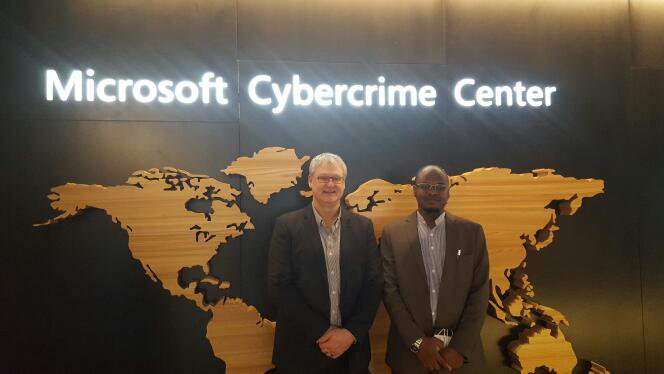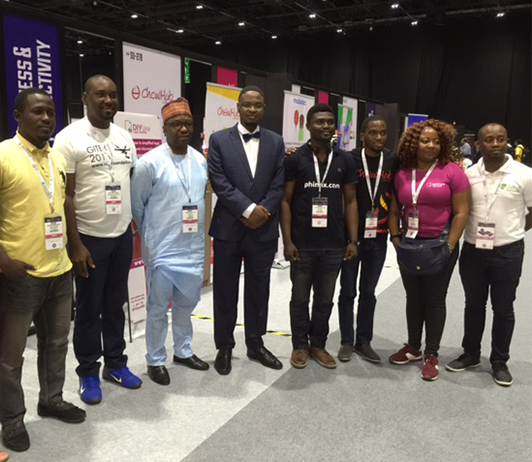By Uwa Suleiman
The hype about developing indigenous content in Information Technology (IT) has gained momentum in the last few years, with brilliant suggestions from stakeholders. The blueprint is exceptional and is in fact proof, that there is immense potential within our shores. Experts have spent countless hours at various fora, discussing this very topic and proffering excellent strategies aimed at developing local competencies. Of course it is a worthwhile venture deserving of the attention it commands, from those who should know.


Partnering for Strength: NITDA’s Dr Isa Ibrahim Pantami at a recent tour of Microsoft’s Cybercrime Defence Operation Centre, USA.
It is a given, that any nation which truly desires real advancement, must embrace IT and its tools in its entirety. There are no half measures in the technology world. Now, the adoption and acceptance of IT for real development, goes beyond having the wherewithal and access to procuring these technologies. Where this exists, it is merely a façade, an institutionalized “borrowed technology” which cannot substitute real, indigenous technological advancement in the true sense of the word. The total importation of already manufactured components for assemblage or the status of a download economy is NOT local content development. This, is the crux of the matter.
Facebook plans to shoot down terrorists’ posts https://t.co/s0NthJxvU8#Facebook #FacebookLive @facebook pic.twitter.com/3Si2V7CA7L
— ITEdgeNews.NG (@ITEdgeNewsNG) May 18, 2017
Local Content development refers to developing indigenous competencies that translate to “owned” technology, increased productivity and revenue generation. To achieve this, capacity development must be given paramount importance as it is impossible to develop local content without building home grown capabilities. IT is foreign and therefore, interactions between both sides of the divide must be encouraged and supported for knowledge transfer to properly take place.
The inimical factor to progress here, lies in scenarios where resources are invested towards building local capacities and yet, no real value is added to the economy. It is in this area where technology has become a cash cow for corrupt institutions and individuals in public service that NITDA has raised the bar.


Promoting local IT entrepreneurs to global area. Director General of NITDA, Dr Isa Ibrahim Pantami, Director of Corporate Strategies and Research and some Nigerian startups at the GITEX 2016.
A very important aspect of NITDA’s mandate is to ensure that the “…..citizenry is empowered……through a critical mass of IT proficient and globally competitive manpower”. To gain enough grounds deemed globally competitive, we must be ‘indigenously’ productive.
Since assumption of office, the Isa Ali Ibrahim Pantami led administration in NITDA has given a new lease of life to local content development through capacity building. The huge difference is implementation. This has been exemplified within the Agency itself as charity begins at home.
Staff of the Agency are not only being exposed to appropriate skill acquisition and enhancement environments, but are challenged to put to practice knowledge and expertise gained, in solving real time problems as they arise. The NITDA of today under the present administration of Dr Isa Ali Ibrahim Pantami is an ideal workplace where resources spent on capacity development can be justified. There exists a level playing field, where capacities are developed, tested and encouraged to flourish.
A very important aspect of NITDA’s mandate is to ensure that the “…..citizenry is empowered……through a critical mass of IT proficient and globally competitive manpower”
Furthermore, Dr Pantami is an unrepentant believer in the immense potential Nigeria is blessed with, and what change it could bring if properly explored and guided, and he is steadily making that change. Employing legitimate strategies to empower Nigerians especially young talented ones, youths, women and even children, through institutions and organizations, dedicated innovative programmes and projects designed for that specific goal. “To place Nigeria on a globally competitive pedestal, we must empower the populace. Expose our talents to knowledge transfer environments and give policy direction to encourage investments here at home”. When faced with a challenge, the conflict resolution expert would device ingenious ways to forge ahead rather than give up.
At the peak of the recession, the Agency’s ability to fulfill its responsibilities to its NITDEF scholars in some of the best universities around the world was threatened. It would be unheard of that an Agency of NITDA’s status, led by a man of his reputation, failed to deliver on one of its key mandates. Supported by his able Management team, a most brilliant, mutually beneficial idea was hatched and today, the Agency is in strategic partnerships with some institutions of global repute, which allows Nigerian scholars acquire the desired knowledge enabled by a novel, cost effective arrangement which also includes gaining hands on, practical experience in their various fields of study. That is the attitude we must adopt in the quest for national advancement, for where there is a will, there is a way.
Beyond the four walls of the Agency, the implementation strategy is gaining momentum nationwide in critical aspects of the economy. Dr Pantami is pushing beyond the barriers of mere talk. At the moment, the Agency is providing technical support to JAMB and a few other key institutions around the country and many more are reaching out for partnerships and collaborations in that regard. A practical personality, his actions are backed by law as the Agency’s Act of 2007 empowers it to also enforce compliance and where and when necessary, penalize by fine and or, imprisonment for up to three years.
Dr Pantami has read the riot act to multinational IT corporations: Establish your factories here in Nigeria and employ an appreciable percentage of Nigerians in knowledge transfer areas so that we can build capacities for self sufficiency and sustainability.
Every budget year, very considerable resources are plunged into “IT PROJECTS”, with a sizable chunk directed at trainings. Yet, consultants and contractors from other countries are hired for those same skills thereby, breeding redundancy, wasting both human and financial resources, obstructing economic development and aiding corruption. Dr Pantami has read the riot act to multinational IT corporations: Establish your factories here in Nigeria and employ an appreciable percentage of Nigerians in knowledge transfer areas so that we can build capacities for self sufficiency and sustainability.
A few months ago, Cyber giant Microsoft, responded and invited the Agency to its headquarters in America on an all expense paid trip to inspect its facilities and put pen to paper on strategies geared towards a win, win partnership for both parties. The agreements reached are being fine tuned at the moment. Oracle, HP, Intel and NOKIA are in various stages of discussions with the Agency.
NITDA is exemplifying and spreading the message of change: we empower to deploy. When we train, we must put to test, knowledge gained. That is the only road to improvement. In enforcing policies that would fire imaginations, inspire innovation, challenge creativity and make history, we must take risks.
The Litmus Test that NITDA and indeed, the entire Nigerian IT sector must pass presents itself in the fast approaching 2019 Elections. Can we provide the best training out there to our best minds and trust them to provide a solid, trusted, secure platform for the 2019 elections? Can indigenous competencies compete in that regard with global counterparts? A task of this magnitude has never been undertaken by the Agency before, but Dr Isa Ali Ibrahim Pantami FBCS, believes without a doubt that it can be done. He proudly cites examples like that of some Agency staff who recently participated in a highly technical training in India, and as proof that there is no dearth of human potential in this country, they emerged tops in the examinations leading in Africa and even beating their Indian counterparts to earn global recognition.
Local Content development refers to developing indigenous competencies that translate to “owned” technology, increased productivity and revenue generation. To achieve this, capacity development must be given paramount importance as it is impossible to develop local content without building home grown capabilities.
Dr Pantami is quick to point out that NITDEF Scholars are among some of the best in their various fields of IT studies, in some of the best Universities in the world. There is also the abounding talent among the startups, the young innovators hub (who by the way always make history at competitive for a like GITEX, ITU etc whenever they come up against their counterparts from other parts of the world), and the various institutions of learning the Agency supports. There are also Nigerians who joined the brain drain wagon, are highly skilled and are willing to be part of this transformation if enabling policies are implemented. He unapologetically believes that Nigeria has the requisite potential to develop the needed software to conduct the elections. And I absolutely agree with him. And so should every patriotic citizen of this country. In fact, to think that it cannot be done, is intellectual dishonesty.
To develop the requisite software and host credible secure, elections in Nigeria for Nigerians and by Nigerians, is not rocket science. It is a project that requires determination, commitment and the “can do” spirit demonstrated by the current leadership of NITDA. It is long overdue for Nigeria to deploy a national fibre backbone. This is the ultimate platform for content development. It means the ubiquitous nature of cloud services can be maximally exploited. It means cloud computing competencies can be explored, It means national information can be secured because afterall, the essence of a fibre backbone is information security. It is no secret that although the card readers used for the last elections were manufactured in China and programmed in the United States of America, the platform was hosted in Nigeria. But we can dare to go the whole nine yards.
To this end, NITDA is in consultations with the Independent National Electoral Commission already. Due Processes have begun and anyone can imagine how wide the dragnet could be. This is the challenge we must all rise up to. And as Dr. Pantami would say, “NITDA cannot do it alone.” Professional bodies like NCS, CON, ISPON, ITAN, hardware manufacturers, programmers, technicians, OEMs, educational institutions, students in diaspora especially NITDEF Scholars, policy makers, financial institutions, everyone should be involved. Let the best put their best foot forward. Let every stakeholder answer this clarion call to test arms and expand frontiers. It is only when we can boast of homegrown technology that we can truly pride ourselves of being compliant. Only then can we be assured of economic transformation and survival. The only other viable option to oil is Information Technology, with the added perk of longevity.
NITDA, under the able leadership of Isa Ali Ibrahim Pantami PhD, FBCS is on a sure and steady course to becoming the agent of national transformation it was established to be: provide the platform for the take off of all IT endeavours. The ultimate blueprint is in the offing, Implementable guidelines drafted by the best brains in the Agency’s employ, trained and reformed by the Agency. That platform is the deployment of a national fibre backbone. Don’t be left behind, do your bit. It is happening already!
Uwa Suleiman is NITDA’s Spokesperson































